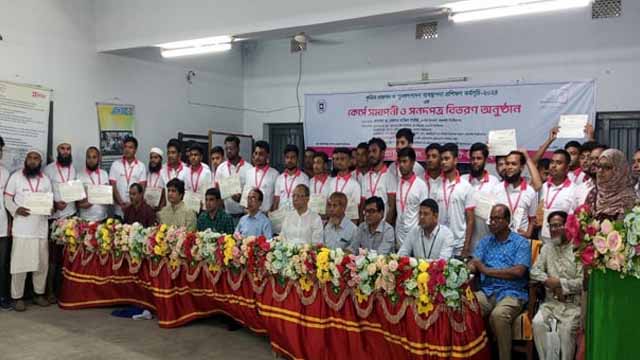
Reaching artificial insemination services to farmers' doorsteps stressed
Published:
২ এপ্রিল ২০২৪, ১২:৩৫

All field level officials, employees and volunteers concerned should discharge their duties with utmost sincerity and honesty to reach artificial insemination services to farmers doorsteps for improving cattle varieties and to fulfill the region's gradually mounting demands for protein.
Large-scale promotion of the livestock sector is very important to remove the existing protein deficiency alongside ensuring food security. So, utmost emphasis should be given on promoting the artificial insemination in cattle after the best uses of modern technologies.
Academics and researchers came up with the observation while addressing the closing and certificate-giving ceremony of a two-month long volunteer training titled "Artificial Insemination and Regeneration Management" here on Monday afternoon.
BRAC and the Department of Veterinary and Animal Sciences of Rajshahi University (RU) jointly organised the training for the artificial insemination service providers at RU Narkelbaria campus.
RU Vice-chancellor (VC) Professor Golam Sabbir Sattar addressed the ceremony as the chief guest, while Pro-VCs Prof Sultan-Ul-Islam and Prof Humayun Kabir spoke as special guests with former Dean of Veterinary and Animal Sciences Faculty Professor Jalal Uddin Sarder in the chair.
Faculty Dean Prof Khandaker Mozaffar Hossain, Registrar Prof Tariqul Hassan, Proctor Prof Asabul Haque and Deputy Chief Veterinary Officer Dr Hemayetul Islam also spoke.
VC Prof Golam Sabbir said the region has an enormous prospect of expanding the livestock sector through best uses of its existing natural resources.
Highlighting the importance of the artificial insemination programme he said the cross-breed calves are comparatively more superior to the local ones so they need special care and improved management for the survival.
The unemployment problem in the region, especially in its rural areas, could be reduced to a greater extent through technology transfer and making dairy farming popular at the grassroots level.
Importance should be given on preserving high quality semen in laboratories from cattle after importing the specimens. "If the high-breed cow can give 50-litre milk per day, why not the others," he added.
Modern technology helps increase milk production by one litre from every cow on an average for the last couple of years. Prof Jalal Sarder said artificial insemination has a vital role to play in expansion of cattle breeding and the efforts should be expanded successfully through bringing all the villages under the coverage.
He stressed the need for more intensive research on the genetic factors of domestic animals for generating more high-milking cows. In his remarks, Prof Khandaker Mozaffar Hossain hoped that the training will contribute a lot towards expanding the artificial breeding technology to the target group of people.
He urged the participants to apply the new ideas acquired from the course so that the livestock farmers can derive total benefits of the programme. Prof Mozaffar Hossain said the artificial insemination is now being judged as proven technology and the genetic development of the livestock animal could be ensured through adequate promotion of the technology.
He said production of both milk and meat would be enhanced when the technology could be reached towards the doorsteps of the grassroots farmers successfully.



Comment: